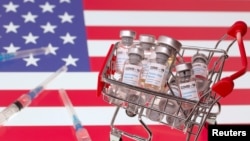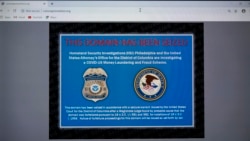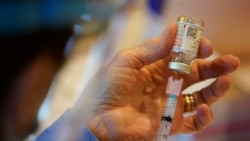Millions of people are waiting for their turn to receive the newly-released COVID-19 vaccines. Delays in getting vaccines to the public, however, have led to a growing number of online scams claiming to offer the shots to anyone willing to pay the right price.
Government officials in the United States and Europe are warning the public not to be fooled by such scams, which they say can be used to steal money and personal data. They can also endanger the health of people falling for the offers.
Reuters news agency searched vaccine offers on internet websites, the Telegram messaging service and places on the “dark web.” The dark web is a part of the internet that cannot be found through normal search engines. It uses digital tools to hide identifying information and is often used for criminal activity.
The Reuters search found at least seven different offers for products claiming to be COVID-19 vaccines.
The scams include emails promising to get people on supposedly secret lists to receive the vaccine early. Other operations place telephone calls to the public claiming to be from government agencies. Messages on the dark web also are seeking to sell COVID-19 vaccines.
On one dark web forum called Agartha, fake COVID-19 vaccines were offered next to cocaine, powerful pain medications, “super high quality fake money” and hand guns. Listings showed images of the real vaccines, offering them for $500 to $1,000.
On Telegram, several places claimed to offer COVID-19 vaccines. One user offered alleged Moderna vaccines for $180, and claimed the vaccine from Pfizer-BioNTech could be bought for $150.
The U.S. Federal Bureau of Investigation (FBI), international policing organization Interpol and other law enforcement agencies are investigating the scams. They have warned that the illegal activities – which can also include offers for false treatments – could present serious health risks.
Internet security company Recorded Future said new website domains containing the words “vaccine” and “COVID-19” or “coronavirus” have more than doubled since October. More than 2,500 sites appeared by November, when the first real COVID-19 vaccines were nearing approval, the company said.
Lindsay Kaye is director of operations for Recorded Future. She told Reuters that some of the domain registrations appear to be aimed at getting people to click on malicious web links that could be used to steal private data.
Kaye said her investigative team has not yet uncovered any real vaccines being offered that came from healthcare providers or official national supplies.
The U.S. Food and Drug Administration, FDA, has approved two COVID-19 vaccines for emergency use. One was developed by Pfizer-BioNTech and the other by Moderna. In a statement, the FDA said it was concerned that other “deceptive and misleading products might cause Americans to delay or stop appropriate medical treatment, leading to serious and life-threatening harm.”
The scams have grown as concerns continue about the slower-than-promised delivery of vaccines to protect against COVID-19. The disease has claimed more than 1.8 million lives worldwide. Experts say that most people will likely have to wait until the spring or summer to get their shots.
By Monday, about 4.5 million Americans had received their first vaccine shot, the U.S. Centers for Disease Control and Prevention reported.
I’m Bryan Lynn.
Reuters and The Associated Press reported this story. Bryan Lynn adapted the reports for VOA Learning English. Mario Ritter, Jr. was the editor.
We want to hear from you. Write to us in the Comments Section, and visit our Facebook page.
_______________________________________________________________
Words in This Story
scam – n. a dishonest way to make money by deceiving people
forum – n. an area of a website where people go to discuss things
fake – adj. false; not real
allege – v. to state without proof that someone has done something illegal
domain – n. the part of an email or website address that shows the name of the organization that the address belongs to
malicious – adj. intended to harm or upset someone
deceptive – adj. intended to make someone believe something that is not true
appropriate – adj. suitable or right for a particular situation or person
deliver – v. the taking of things from one place to another









